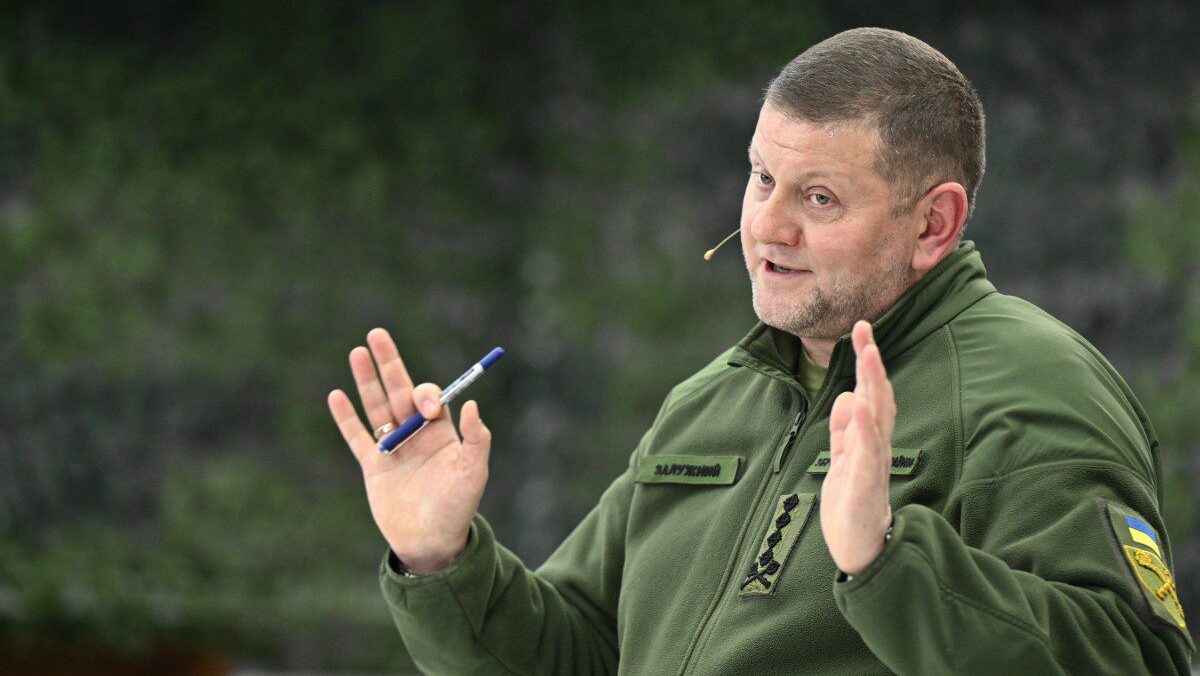
Commander-in-Chief of the Armed Forces of Ukraine Valery Zaluzhnyi gestures as he speaks during a press conference in Kyiv on December 26, 2023, amid the Russian invasion of Ukraine.
Photo: Genya SAVILOV / AFP
Reports of a deteriorating relationship between Ukrainian President Volodymyr Zelensky and commander-in-chief General Valery Zaluzhnyi have resurfaced once again, with the former apparently intent on sacking the latter.
Various Ukrainian and British media sources have reported that Zelensky told Zaluzhny on Monday, January 29th, to resign from his post, threatening to dismiss him by presidential decree, but that the general refused to do so and potential replacements have declined to take on the role.
Ukrainian publication Dzerkalo Tyzhnia revealed that Zaluzhnyi has no intention of submitting a letter of resignation. The paper noted that, in order to remove someone from the post by presidential decree, the defence minister must also give a corresponding order. According to the Financial Times, the fate of Zaluzhnyi is already sealed—the question is when that will happen, and who will replace him. The Ministry of Defence has denied the reports, stating they are “not true.”
However, the Ukrainian publication New Voice begs to differ:
Zaluzhnyi’s resignation is just a matter of time and circumstances. The circumstances include the situation at the front, which is unlikely to improve, as well as Zaluzhnyi’s activities on social media and above all the political activities and ‘talkativeness’ of those around him.
The revelations come amid speculations that Zaluzhnyi and Zelensky have had a falling out in recent months. As we previously reported, Zaluzhnyi wrote pessimistically about his country’s prospects in the war with Russia in an article for The Economist in November. Zelensky disagreed, saying, “Everyone gets tired, no matter their status. And we have different opinions. But it’s not a stalemate.” Military experts, however, believe the Ukrainian army’s counteroffensive against Russia has indeed reached a stalemate; battle lines have hardly moved since the summer. There is increased scepticism both within the United States and the European Union on whether it makes sense to spend billions of dollars in funding Ukraine’s war.
Ukrainian Tavriisk Group of Forces Spokesperson Col. Oleksandr Shtupun reported that Russian forces conducted at least 5 strikes using likely K-51 grenades carrying chloropicrin against Ukrainian positions in the Tavriisk direction (Avdiivka through western Zaporizhia Oblast).… https://t.co/lQ8ximNKTJ
— Institute for the Study of War (@TheStudyofWar) January 31, 2024
Zaluzhnyi also criticised Zelensky’s decision to fire regional military draft office chiefs in a corruption crackdown. “These were professionals, they knew how to do this, and they are gone,” Interfax Ukraine cited the general as saying.
According to Ukrainska Pravda, Zelensky is bypassing Zaluzhnyi when communicating with other commanders and makes sarcastic comments about the general.
Media outlet The Kyiv Independent reports there is growing distrust between the two men, even though they have not made their dispute public. One of the reasons could be that Zaluzhnyi is harbouring political ambitions. His approval rating among the public in a December poll was 88%, while trust in Zelensky significantly declined from 84% to 62% in one year. According to the survey, 26% of respondents have trust in the government, compared to 52% a year ago.
Zaluzhnyi has been mentioned among possible targets for a reshuffle in top military ranks. He is seen as a political threat—backed by ex-President Petro Poroshenko’s party, as well as Kyiv Mayor Vitali Klitschko—and though elections are technically postponed due to martial law, their possibility hangs in the air. Zelensky has warned that the military and politics shouldn’t be mixed. “If a military man decided to do politics, it is his right, then he should enter politics, and then he can’t deal with war,” Zelensky told The Sun.
On Wednesday, Kremlin spokesman Dmitry Peskov told journalists in Moscow that reports of the attempted dismissal exposed “growing differences” between Ukraine’s civilian and military leadership. He added:
It’s obvious that the failed counteroffensive and problems on the fronts are leading to growing differences between representatives of the Kyiv regime—both the military leadership and the civilian one. These differences will grow as Russia’s special operation continues successfully.
